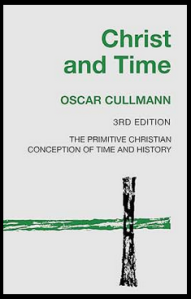CHRIST AND OUR CALENDAR
PMW 2025-063 by Kenneth L. Gentry, Jr.
Gentry note:
These few paragraphs are taken from Oscar Cullman’s book, Christ and Time. His book is arguing that God controls time and that history is properly divided by the birth of Christ as the key event in history. In other words, he is presenting ancient Christianity’s Christo-centric view of history. These few sentences below are important to understand.
Cullmann:
Our system of reckoning time does not number the years in a continuous forward-moving series that begins at a fixed initial point. That method is followed, for example, in the calendar which Sextus Julius Africanus created at the opening of the third century A.D., and in the Jewish calendar, which thinks it possible to fix the date of the creation of the world, and hence designates that event by the year 1 and simply numbers forward from that point. Our system, however, does not proceed from an initial point, but from a center; it takes as the mid-point an event which is open to historical investigation and can be chronologically fixed, if not with complete accuracy, at least within a space of a few years. This event is the birth of Jesus Christ of Nazareth. Thence proceed in opposite directions two enumerations, one forward, the other backward: “after Christ,” “before Christ.”
The practice of numbering back from the birth of Christ, to be sure, did not prevail until the eighteenth-century. Prior to that, and indeed from the Middle Ages, it had long been the practice to reckon the years following the birth of Christ as “years of the Lord”; this method had been introduced in A.D. 525 by the Roman abbot Dionysius Exiguus. Down to the eighteenth century, however, the numbering of the pre-Christian period was not oriented with reference the date of the birth of Christ; rather, the pre-Christian continued to be dated, in accordance with older calendar systems, from the Creation.

As It Is Written: The Genesis Account Literal or Literary?
Book by Ken Gentry
Presents the exegetical evidence for Six-day Creation and against the Framework Hypothesis. Strong presentation and rebuttal to the Framework Hypothesis, while demonstrating and defending the Six-day Creation interpretation.
See more study materials at: www.KennethGentry.com
Hence the theologically decisive and interesting point is not the fact that goes back to Dionysius Exiguus, that the birth of Christ was taken as the starting point of subsequent enumeration; a similar practice had been adopted previously in Babylon, where the enumeration was carried forward from the con quest of the country by Seleucus Nicator, and in Rome, where it was carried forward from the year the city was founded or, in a later system, from the year of Diocletian’s accession.³ The decisive thing is rather the practice, which has been in only for the last two centuries, of numbering both forward and backward from the birth of Christ. Only when this is done is the Christ-event regarded as the temporal mid-point of the entire historical process. The point of departure here, there fore, is not the beginning of the series of happenings. This beginning, according to this enumeration, lies rather at an undetermined point on the line that runs back from the mid point, just as the end lies at an undetermined point on line that stretches forward; on both sides the possibility re mains open of unlimited further enumeration. When we consider the entire line in its chronological course, the result is that the large numbers of the pre-Christian period move in decreasing series toward the number one, while the years after Christ, on the contrary, move forward from the year one into ever larger numbers.
We shall see how this scheme of conceiving time and history corresponds to the Primitive Christian conception of time and history which is to be analyzed in this study. If our task were to present in graphic form the result of our investigation, this Christian system by which we reckon time could serve as pattern.
[image error]For more information and to order click here.
" data-image-caption="" data-medium-file="https://postmillennialworldview.com/w..." data-large-file="https://postmillennialworldview.com/w..." class="alignright size-full wp-image-209" src="https://postmillennialworldview.com/w..." alt="Navigating the Book of Revelation: Special Studies on Important Issues" />Navigating the Book of Revelation (by Ken Gentry)
Technical studies on key issues in Revelation, including the seven-sealed scroll, the cast out temple, Jewish persecution of Christianity, the Babylonian Harlot, and more.
See more study materials at: www.KennethGentry.com
We say “Christian system of reckoning time.” But it is the common system in the Western world. For the attempt to abolish it, undertaken by the French Revolution in the year 1792, was only a brief episode. Yet today scarcely anyone thinks of the fact that this division is not merely a convention resting upon Christian tradition, but actually presupposes fundamental assertions of New Testament theology concerning time and history. These presuppositions are just as foreign to present day thought as the Christian calendar is familiar to it. To this strangeness we desire to point in the following introductory remarks; they simply present in a preliminary way, but in all their bluntness, the consequences that result from the conception which Primitive Christianity had of time and history.
Gentry closing note:
I recommend getting and reading this entire book. Not everything in it is acceptable, but his main argument is very insightful and helpful. To read the whole book, you may get it at Amazon
Click on the following images for more information on these studies:



Kenneth L. Gentry Jr.'s Blog
- Kenneth L. Gentry Jr.'s profile
- 85 followers



